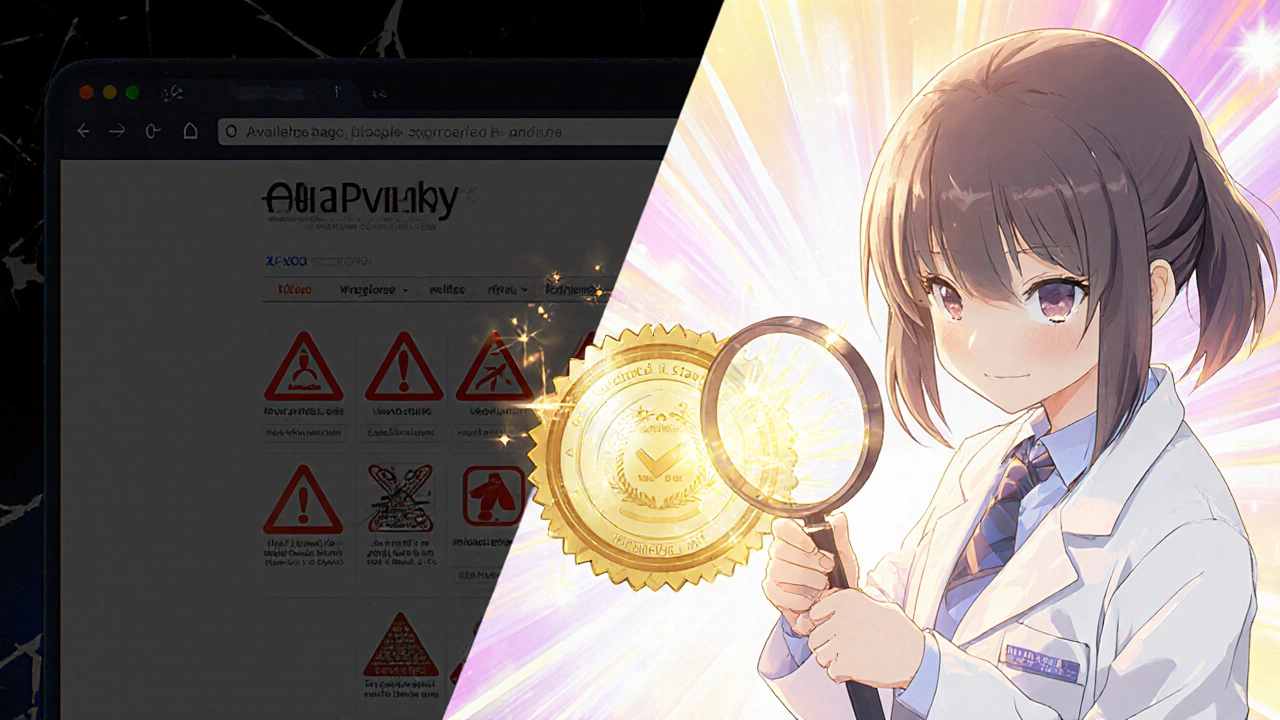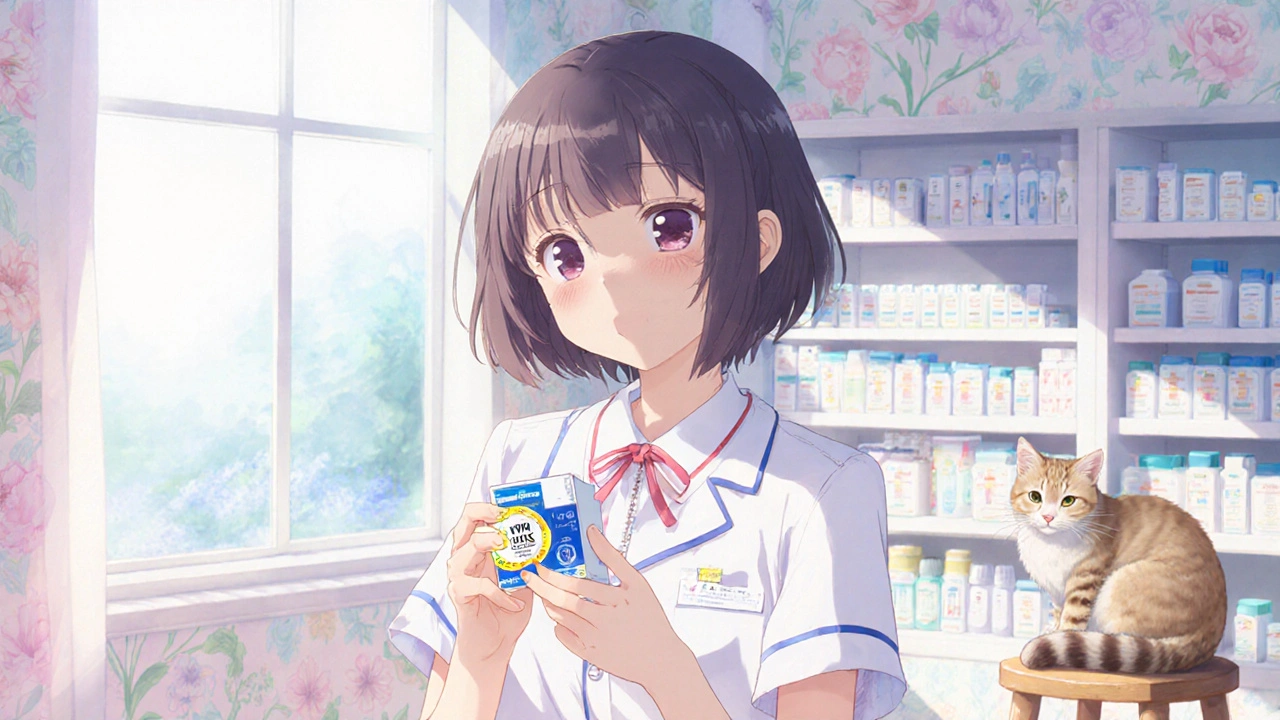When you order medicine online, how do you know it’s safe? Not every website selling pills is legit. Some sell fake drugs. Others ship expired stock. Some don’t even require a prescription. That’s where pharmacy accreditation comes in - it’s not just a logo on a website, it’s a guarantee that the pharmacy follows real, verified standards.
What Is Pharmacy Accreditation?
Pharmacy accreditation is a formal process where an independent organization checks if a pharmacy meets strict rules for safety, quality, and ethics. Think of it like a health inspection for pharmacies - but instead of a local inspector walking in, it’s a national or international body reviewing everything from how drugs are stored to how prescriptions are handled.
Accreditation isn’t optional for serious pharmacies. It’s required by law in many countries. In the U.S., the National Association of Boards of Pharmacy (NABP) runs the Verified Internet Pharmacy Practice Sites (VIPPS) program. In Australia, the Therapeutic Goods Administration (TGA) oversees accreditation for online sellers. In the EU, it’s the national health authorities under the European Medicines Agency.
These programs don’t just check paperwork. They send undercover buyers to test delivery times, verify prescriptions, and confirm that the medicines match what’s listed. A pharmacy that passes this level of scrutiny earns a seal - and that seal means something.
Why Does It Matter for Patients?
Every year, thousands of people get sick or worse from fake or contaminated medicine bought online. The World Health Organization estimates that 1 in 10 medical products in low- and middle-income countries are substandard or falsified. Even in wealthy countries, unaccredited online pharmacies are a growing risk.
Accredited pharmacies ensure you get:
- Medications made by licensed manufacturers
- Proper storage conditions (temperature, humidity control)
- Valid prescriptions checked by licensed pharmacists
- Clear labeling with expiration dates and batch numbers
- Real customer support with licensed staff
Without accreditation, you’re gambling. You might think you’re saving money by buying from a cheap site. But if you get a fake version of your blood pressure pill, the cost isn’t just financial - it’s your health.
How Accreditation Protects Against Fraud
Unaccredited online pharmacies often look professional. They have sleek websites, fake testimonials, and even fake contact numbers. Some even copy the branding of real hospitals or clinics.
Accreditation stops this by requiring:
- Physical address verification - no PO boxes allowed
- Real pharmacist on staff, available during business hours
- Transparent pricing - no hidden fees or surprise charges
- Secure payment systems with encryption
- Public access to accreditation status - you can verify it yourself
For example, if you see a pharmacy claiming to be VIPPS-certified, you can go to the NABP website and type in their name. If they’re not listed, they’re lying. Accredited pharmacies make this easy. They display their certification badge prominently and link directly to the official verification page.
Accreditation vs. Licensing: What’s the Difference?
Many people confuse accreditation with licensing. They’re not the same.
Licensing means the pharmacy has met basic legal requirements to operate in a state or country. It’s the minimum bar. Accreditation is the gold standard.
A pharmacy can be licensed in one country but still sell unsafe products internationally. Accreditation means it’s been evaluated against global best practices. For example, a pharmacy licensed in India might be legal there, but if it’s not accredited by NABP or the Canadian International Pharmacy Association (CIPA), it’s not safe to buy from if you’re in the U.S. or Australia.
Think of it like a driver’s license vs. a racing license. Anyone can get a regular license. But only those who pass advanced training get to race.
How to Spot an Accredited Pharmacy
Here’s how to check if a pharmacy is truly accredited:
- Look for the accreditation seal - VIPPS, CIPA, or similar - on the homepage.
- Click on the seal. It should link to the official verification page on the accrediting body’s website.
- Check the physical address. It should be a real building, not a mail drop.
- Verify the pharmacy’s phone number. Call them. If no one answers or it’s an automated system, walk away.
- Ask if they require a prescription. Legit pharmacies always do.
If any of these checks fail, don’t buy. It’s not worth the risk.
What Happens If a Pharmacy Loses Accreditation?
Accreditation isn’t a one-time award. It’s renewed every year. Pharmacies must reapply, pay fees, and pass new inspections. If they cut corners - like using unverified suppliers or failing to verify prescriptions - they lose their status.
When that happens, the accrediting body publicly removes them from their directory. Some are even shut down by regulators. The NABP has revoked over 500 VIPPS certifications since 2005. Many of those sites were selling counterfeit Viagra, insulin, and cancer drugs.
That’s why you should always check the current status before buying. A badge that was valid last year doesn’t mean it’s valid today.

Accreditation and Online Pharmacies
Online pharmacies are growing fast. In 2025, global online pharmacy sales are expected to hit $230 billion. But with that growth comes more risk. Many consumers don’t know how to tell the difference between a real pharmacy and a scam site.
That’s why accreditation is more important than ever. If you’re looking for a reliable source to buy prescription meds online, make sure the pharmacy is accredited. For example, if you’re considering alternatives to RXConnected, you should only trust those that display verified accreditation badges. You can compare trusted options at RXConnected online pharmacy - but only after confirming each site’s accreditation status.
What to Do If You’ve Been Scammed
If you bought medicine from a site that turned out to be unaccredited:
- Stop using the product immediately
- Save all receipts, emails, and packaging
- Report it to your country’s health authority - in Australia, that’s the TGA
- File a complaint with your payment provider
- Consult your doctor if you’ve taken any of the medication
Most scams are small operations. Reporting them helps shut them down before they hurt someone else.
The Bigger Picture: Why Accreditation Saves Lives
Accreditation isn’t about bureaucracy. It’s about trust. It’s the difference between a pharmacy that cares and one that just wants your money.
When you choose an accredited pharmacy, you’re not just buying pills. You’re choosing safety. You’re choosing transparency. You’re choosing a system that holds them accountable.
And in a world where fake medicine is easier to find than real help, that’s not just smart - it’s essential.


Bruce Bain
November 19, 2025 AT 02:51Just last week I bought my dad’s blood pressure meds from a site that looked legit. Turned out it was fake. He got sick for a week. Never again. Always check the seal. It’s not hard, but most people don’t bother.
Jonathan Gabriel
November 19, 2025 AT 21:10So… accreditation is like a Yelp badge for pharmacies? Except instead of reviewing the wait time or the barista’s attitude, we’re checking if the insulin hasn’t been sitting in a desert for six months? 🤔 I mean, if a pharmacy can’t even verify its own supply chain, why should I trust their ‘VIPPS’ badge? Also, typo: ‘verified internet pharmacy practice sites’ - why is ‘practice’ singular? Feels off.
Don Angel
November 21, 2025 AT 00:25Wow. Just… wow. This is the most important thing I’ve read all year. Seriously. I never thought about how a pharmacy’s storage conditions could kill someone. I mean, heat, humidity, expired meds - it’s not just a ‘maybe’ thing. It’s a ‘your grandma’s heart stops’ thing. Please, everyone - check the seal. Don’t be lazy. It’s not that hard.
deepak kumar
November 22, 2025 AT 22:43In India, we have a similar system called CDSCO, but most online sellers ignore it. People buy because it’s cheap, not because it’s safe. I always tell my cousins: if the price is too good to be true, it’s probably poison. Accreditation is the only shield we have.
Dave Pritchard
November 24, 2025 AT 06:32Great breakdown. I’ve been telling my coworkers this for years. I even made a one-pager for our office health fair. People don’t realize how easy it is to get scammed. A quick check on NABP’s site takes 30 seconds. Do it. It’s not a hassle - it’s a lifesaver.
kim pu
November 26, 2025 AT 00:01Accreditation? LOL. That’s just corporate theater. The same agencies that certify pharmacies also get funding from Big Pharma. Ever wonder why no one ever cracks down on the big players? They’re the ones shipping gray-market insulin from China under ‘licensed’ labels. The seal? Just a sticker on a coffin.
malik recoba
November 27, 2025 AT 02:01my brother got sick from fake diabetes meds last year… we thought it was just bad luck. turns out the site had a fake vipps badge. i wish i’d known this before. thanks for sharing. i’m sharing this with my whole family now.
Sarbjit Singh
November 28, 2025 AT 23:02Bro this is so true!! 😊 I always check the seal now. Even if it takes 2 mins. Better safe than sorry. I even screenshot the verification page and send it to my mom when she wants to buy meds online. She thinks I’m overdoing it… but hey, I’m the one who saved her life! 😎
Angela J
November 29, 2025 AT 14:57Wait… so you’re telling me the government is letting fake drugs into the country? And they’re calling this ‘accreditation’? That’s not safety - that’s a scam within a scam. Who’s really behind these ‘accrediting bodies’? Are they linked to the FDA? Are they owned by Pfizer? I’ve seen the documents… they’re hiding something. This is all a cover. They want us to keep buying from them. Don’t trust the badge. Trust your gut.
Sameer Tawde
November 30, 2025 AT 07:23Simple rule: No accreditation? No buy. No exceptions. Your health isn’t a gamble. Period.
Erica Lundy
December 1, 2025 AT 00:17The epistemological underpinnings of pharmaceutical accreditation, as presented, assume a Cartesian binary between ‘legitimate’ and ‘fraudulent’ entities - yet the ontological status of ‘trust’ itself remains uninterrogated. If accreditation is merely a performative signifier of institutional legitimacy, does it not risk becoming a Foucauldian apparatus of surveillance, wherein compliance replaces ethical accountability? The seal, then, is not a guarantee - but a ritualized abdication of responsibility by the consumer.
Alexis Paredes Gallego
December 1, 2025 AT 15:25EVERY SINGLE ONE OF THESE ‘ACREDITED’ PHARMACIES IS A FEDERAL COVER-UP. I KNOW A GUY WHO WORKED AT NABP - HE SAID THEY GET PAID TO IGNORE THE BIG ONES. THE ‘VIPPS’ BADGE? IT’S A LIE. THEY’RE SELLING YOUR DATA TOO. I’VE GOT THE EMAILS. THE GOVERNMENT IS IN ON IT. YOU THINK YOU’RE SAFE? YOU’RE BEING WATCHED. EVERY CLICK. EVERY PURCHASE. EVERY BLOOD PRESSURE READING. THEY WANT YOU DEPENDENT. AND THE BADGE? IT’S A TRAP.
Saket Sharma
December 1, 2025 AT 21:11Accreditation is a myth. Real pharmacies don’t need badges - they have reputation. The entire system is a rent-seeking racket designed to funnel money into bureaucratic pockets. If you’re buying online, you’re already compromised. Stop pretending regulation = safety. It’s just profit with paperwork.
Shravan Jain
December 3, 2025 AT 13:35Let’s be honest - accreditation is a corporate fig leaf. The real issue is globalization of pharmaceutical supply chains. No single agency can monitor every vial shipped from Mumbai to Milwaukee. The system is inherently flawed. The ‘seal’ is a placebo for the anxious middle class. You think you’re protected? You’re just emotionally reassured while the real players operate in the shadows.
Brandon Lowi
December 4, 2025 AT 04:51Accreditation? That’s just a fancy word for ‘American-approved.’ Why should we trust some EU or Indian agency? We’ve got the best medicine in the world - made here, tested here, regulated here. Anything else? It’s foreign garbage wrapped in a badge. If you’re not buying from a U.S.-based, NABP-certified pharmacy, you’re risking your life for cheap imports. And don’t tell me ‘it’s cheaper’ - your life isn’t a bargain bin.